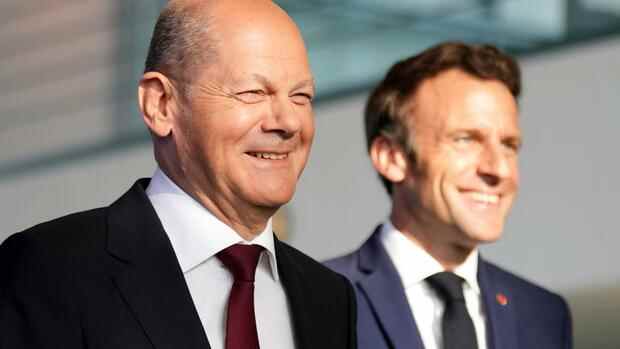Inaugural visit of the re-elected French President.
(Photo: AP)
Paris Chancellor Olaf Scholz (SPD) and French President Emmanuel Macron have called on Russia’s head of state Vladimir Putin for an immediate ceasefire and peace talks in Ukraine. During Macron’s inaugural visit after his re-election in Berlin on Monday evening, both politicians acknowledged that Putin had refrained from further escalation in his World War II commemoration speech.
“There was no further escalation today,” Macron said. But that is not enough. A ceasefire is needed “as soon as possible” to achieve peace and a “sustainable withdrawal of Russian troops” from Ukraine.
Scholz demanded that negotiations for an end to the war be resumed and “more concrete”. “In this respect, it is important that the escalation is not pushed further, at least as far as the rhetoric is concerned.”
What is decisive, however, is how Russia behaves in Ukraine in the coming weeks. Putin must withdraw the troops. In addition, it was “inconceivable that Ukraine would accept a dictated peace”.
Top jobs of the day
Find the best jobs now and
be notified by email.
At a large military parade in Moscow marking the 77th anniversary of the Soviet Union’s victory over Nazi Germany in World War II, Putin did not order a general mobilization as feared. However, he again justified his aggressive war with the claim that he was fending off an alleged aggression from the West and taking action against the “neo-Nazis” ruling in Kyiv.
Scholz open to Macron’s ideas on the future of the EU
The future of Europe was also a topic of conversation for the two. Scholz was open to Macron’s idea of a European political community that would give Ukraine and other states in the EU’s neighborhood a European perspective.
The French President made the proposal on Monday in a speech to the EU Parliament in Strasbourg, also because under the current accession requirements, Ukrainian EU membership is still years or even decades away.
“The risk is that we will discourage our neighboring countries, which share the same values,” Macron said at his meeting with Scholz about the lengthy process of joining the European Union. “So we have to find a new political form.” In addition to security issues, cooperation in the expanded group of states could also include cooperation on energy policy or entry rules.
Scholz spoke of a “very interesting proposal”. However, this path should not restrict the countries of the Western Balkans’ EU accession prospects.
Macron pointed out that in June the EU will hold a summit with Albania, Bosnia and Herzegovina, Kosovo, North Macedonia, Montenegro and Serbia, each at different stages of the accession process.
Reception with military honors.
(Photo: AP)
The French President renewed his call for a fundamental reform of the EU institutions, which he had previously put forward in the European Parliament, which would also require treaty changes. Faced with skepticism in a number of member states, he said that in Europe there is rarely unity at the start of a process. It is now a question of finding a compromise.
Scholz expressed reservations on Monday evening: “Wherever a consensus can be reached, we are happy to be there.” More efficient decision-making mechanisms can also be achieved in Europe without treaty changes. For example, the principle of majority voting could already be used in more policy areas than before, so that individual states can no longer block with their veto.
Franco-German Council of Ministers planned
The Chancellor congratulated Macron “from the bottom of his heart” on his re-election last month. It is a “good sign” that the French have continued to advocate a pro-European course. The Franco-German partnership is “more important than ever as a motor for the European project”. After the French parliamentary elections in June, a Franco-German Council of Ministers is also planned. “Our goal: new impetus for Europe,” said Scholz.
However, it remains to be seen whether Macron will regain a majority in the National Assembly with his center alliance. Last week, the left-wing populist EU critic Jean-Luc Mélenchon united the fragmented left camp and is pursuing the goal of becoming Prime Minister to counterbalance Macron.
An alliance victory is considered possible. If Macron, with allied parties of the center right and center left, fails to win a majority in parliament, he would effectively be forced to take his political opponents into account when forming a government and legislating.
More: Long-distance duel on Europe Day – Putin celebrates his military, the EU its democracy
